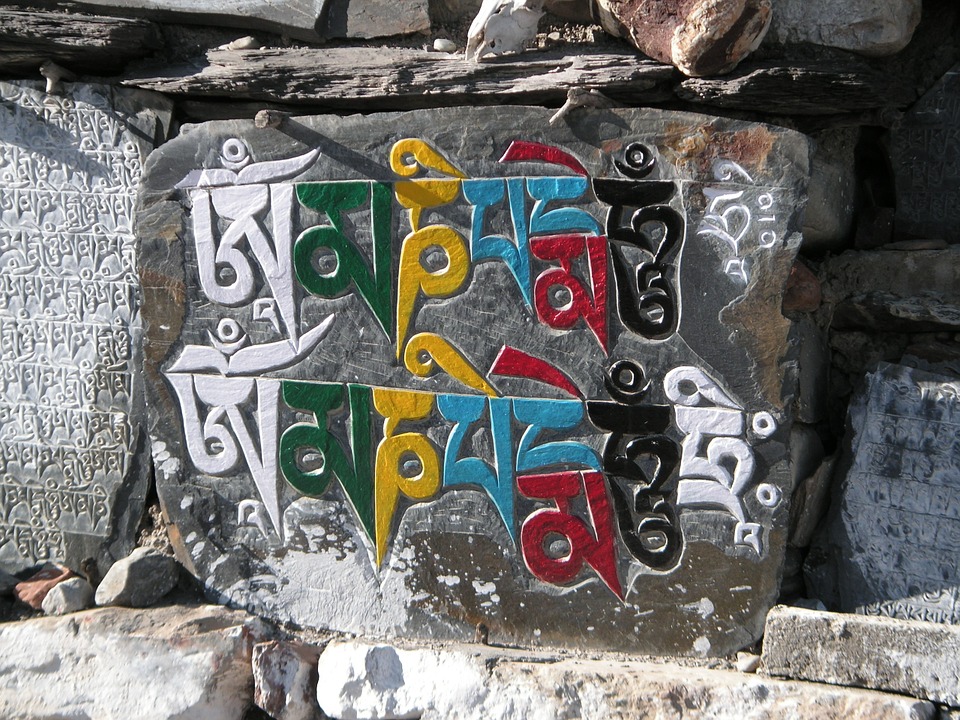It is very good to recite the mantra Om mani Padme hum, but while you are doing it, you should be thinking about its meaning, for the meaning of the six syllables is great and vast. By His Holiness Dalai Lama
All beings want happiness and freedom from suffering. To achieve this, inner development is more effective than material development. As a ‘Science of Mind’ Buddhism has a lot to contribute in terms of ways to bring about this inner development. The mantra of the Buddha of Compassion (Om Mani Pad Me Hum) reflects the essence of Buddhism. Its explanation has two presentations – Philosophical and Religious.
Philosophically, it implies transformation from impurity to purity via a practice that unifies altruism and wisdom of emptiness that knows the nature of reality. Altruism fosters universal love. It promotes an attitude of other-cherishing as opposed to self-cherishing. The Buddhist view of inter-relatedness of all phenomena provides the wisdom of emptiness that helps us dilute the sense of self and cherish others.

Religiously, it is a prayer to Avalokiteshvara (the Buddha of Compassion). Through a recitation of this mantra, the faithful seek blessings to transform themselves from an impure state to the pure state of the Buddha. Syllables in the mantra reflect the object, means, and result of purification.
This purity of the enlightened body has to be achieved by the indivisible unity of method and wisdom. In the Sutra system, the indivisibility of method and wisdom refers to wisdom affected by method and method that is affected by wisdom. But, in the Tantra system, it refers to one consciousness that has fully developed both method and wisdom as one undifferentiated entity.
Om mani padme hum meaning simple by Dilgo Khyentse Rinpoche
“When you say the first syllable ‘Om’ it is blessed to help you achieve the perfection in the practice of generosity, Ma helps perfect the practice of pure ethics, and Ni helps achieve perfection in the practice of tolerance and patience, Pa, the fourth syllable, helps to achieve perfection of perseverance, Me helps achieve perfection in the practice of concentration, and the final sixth syllable Hum helps achieve perfection in the practice of wisdom. So in this way recitation of the mantra helps achieve perfection in the six practices from generosity to wisdom.”
Dilgo Khyentse, The Heart Treasure of the Enlightened Ones: The Practice of View, Meditation, and Action
Quotes of His Holiness The Dalai Lama on Om mani Padme hum
“It is very good to recite the mantra Om mani Padme hum, but while you are doing it, you should be thinking on its meaning, for the meaning of the six syllables is great and vast… The first, Om […] symbolizes the practitioner’s impure body, speech, and mind; it also symbolizes the pure exalted body, speech, and mind of a Buddha[…]”
“The path of the middle way is indicated by the next four syllables. Mani, meaning jewel, symbolizes the factors of method: (the) altruistic intention to become enlightened, compassion, and love.[…]”
“The two syllables, Padme, meaning lotus, symbolize wisdom[…]”
“Purity must be achieved by an indivisible unity of method and wisdom, symbolized by the final syllable hum, which indicates indivisibility[…]”
“Thus the six syllables, om mani Padme hum, mean that in dependence on the practice of a path which is an indivisible union of method and wisdom, you can transform your impure body, speech, and mind into the pure exalted body, speech, and mind of a Buddha[…]”
Related Articles
